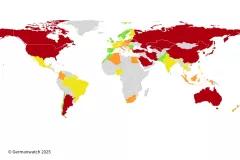New analysis by NewClimate Institute shows that whilst Japan's draft INDC achieves a significant amount of benefits for the economy and the domestic population through cost savings and reduced deaths from air pollution, the scale of the potential benefits from more ambitious action that are missed by the limited ambition of the draft INDC is much greater. By 2030, Japan could achieve and annual cost savings of around USD 25 billion, could save approximately 15,000 premature deaths each year from reduced ambient air pollution, and could support an extra 67,000 full time equivalent jobs in the renewable energy sector, in addition to the benefits achieved by the draft INDC compared to current policies.
See the full assessment of co-benefit potential for Japan
This analysis was published on Monday 8th June in a larger report containing an assessment for five major countries. This report first provides an overview of the general co-benefits that climate action may have and how they could be used to incentivise further ambitious greenhouse gas (GHG) reductions. We then provide illustrative results for the co-benefits achieved by the INDCs of the U.S., China, the EU, Canada and Japan, as well as an indication of the forgone or missed benefits that could have been achieved through action that leads to 100% renewable energy in 2050.





